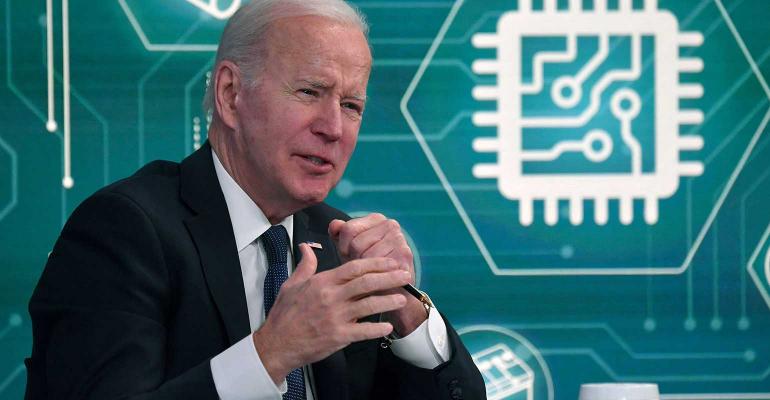President Joe Biden's sweeping executive order calling for a review of cryptocurrency and its regulation should be a reassuring move for financial advisors, as well as legitimate purveyors of financial services and products for intermediaries, according to industry observers and leaders.
"Traditional wealth managers" have been left out of the cryptocurrency space, said Wally Okby, strategic advisor of the wealth management division at Aite-Novarica Group. "President Biden’s executive order is a great first step toward securely leveling the playing field."
Biden signed the executive order on Wednesday outlining steps for a sweeping cryptocurrency review that will address consumer and investor protections, financial stability and even national security. The order sets the foundation for federal regulation of digital assets, citing the need to combat dangers such as crime, the circumvention of sanctions and terrorism.
Because traditional wealth managers have to contend with risks like client suitability, custody and market manipulation, they have been late to the game, Okby said. "As a result, private clients interested in the space have funneled billions of dollars into cryptocurrency—outside the purview of their wealth managers—through exchanges and other challenger (nontraditional) direct-to-consumer digital-first platforms such as Robinhood, PayPal and others."
Okby predicted significant progress "in the short term" toward "establishing a regulatory framework."
The move won't just help investors and individual wealth managers. Family offices also stand to benefit, he added. "Certain U.S.-based wealth managers will progress their digital asset agendas faster, to be ready for what I expect to come next," Okby said. Business models and wealth management attitudes about digital assets will experience "meaningful shifts," as portfolios incorporate larger allocations in digital assets.
At least one supplier of crypto-related technology to intermediaries also said the order is a positive development.
"While the executive order represents an extremely high-level viewpoint, one that will take time to result in change, we believe advisors will view today's actions as another unmitigated positive signal that cryptocurrencies are here to stay," said Ben Cruikshank, head of Flourish, a subsidiary of MassMutual that provides a crypto platform for RIAs called Flourish Crypto. Advisors should feel "more comfortable getting off the sidelines, assuming that they are taking a prudent, [compliant] and regulatory-first approach."
Over the next six months, federal agencies will be putting together a report outlining “the conditions that would drive mass adoption of different types of digital assets and the risks and opportunities such growth might present to United States consumers, investors and businesses," according to Biden's directive. The Treasury Department and Department of Labor were instructed to work with the SEC and federal banking agencies to compile several sections of the report, which are to include policy recommendations and potential regulatory and legislative actions.
“The growing use of digital assets in financial activity heightens risks of crimes such as money laundering, terrorist and proliferation financing, fraud and theft schemes and corruption,” according to the order. “These illicit activities highlight the need for ongoing scrutiny of the use of digital assets, the extent to which technological innovation may impact such activities and exploration of opportunities to mitigate these risks through regulation, supervision, public‑private engagement, oversight and law enforcement.”
Biden is also ordering his own version of a report on the future of money and payment systems. The final report is to include a section addressing the implications of creating a United States Central Bank Digital Currency (CBDC).
The Board of Governors of the Federal Reserve System released a paper in January on a so-called “digital dollar” after doing its own study. The paper provided “no firm conclusions on whether issuing such a currency was prudent,” according to a Bloomberg report, which threw cold water on the idea that “a U.S. digital dollar will be issued anytime soon.”
The White House also instructed federal agencies to investigate the economic, environmental and energy impacts of distributed ledger technology, often called “blockchain” technology. A section of the report is to address the potential for mitigating climate impact by the “exchanging of liabilities for greenhouse gas emissions, water and other natural or environmental assets.”





